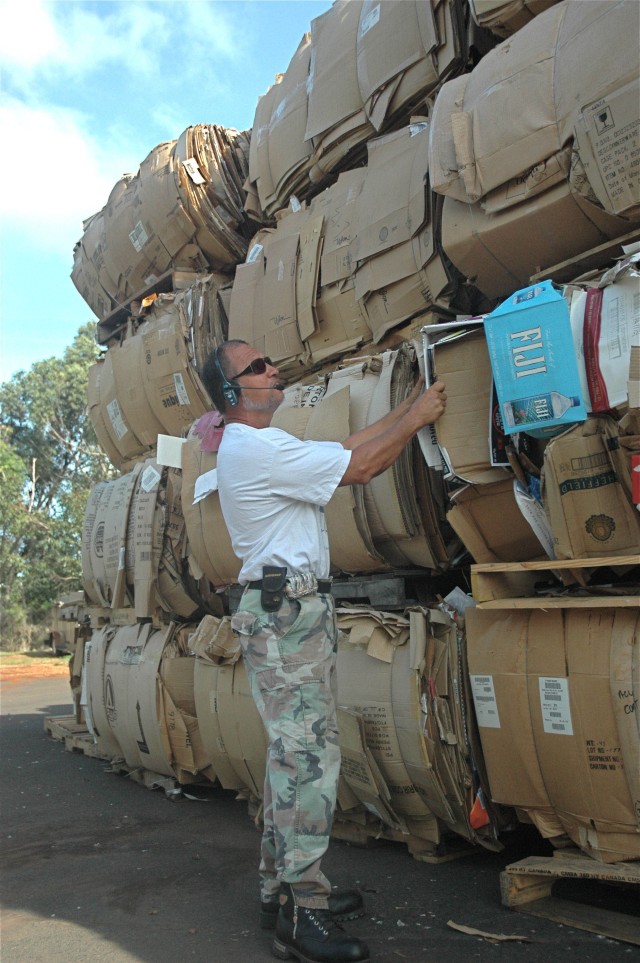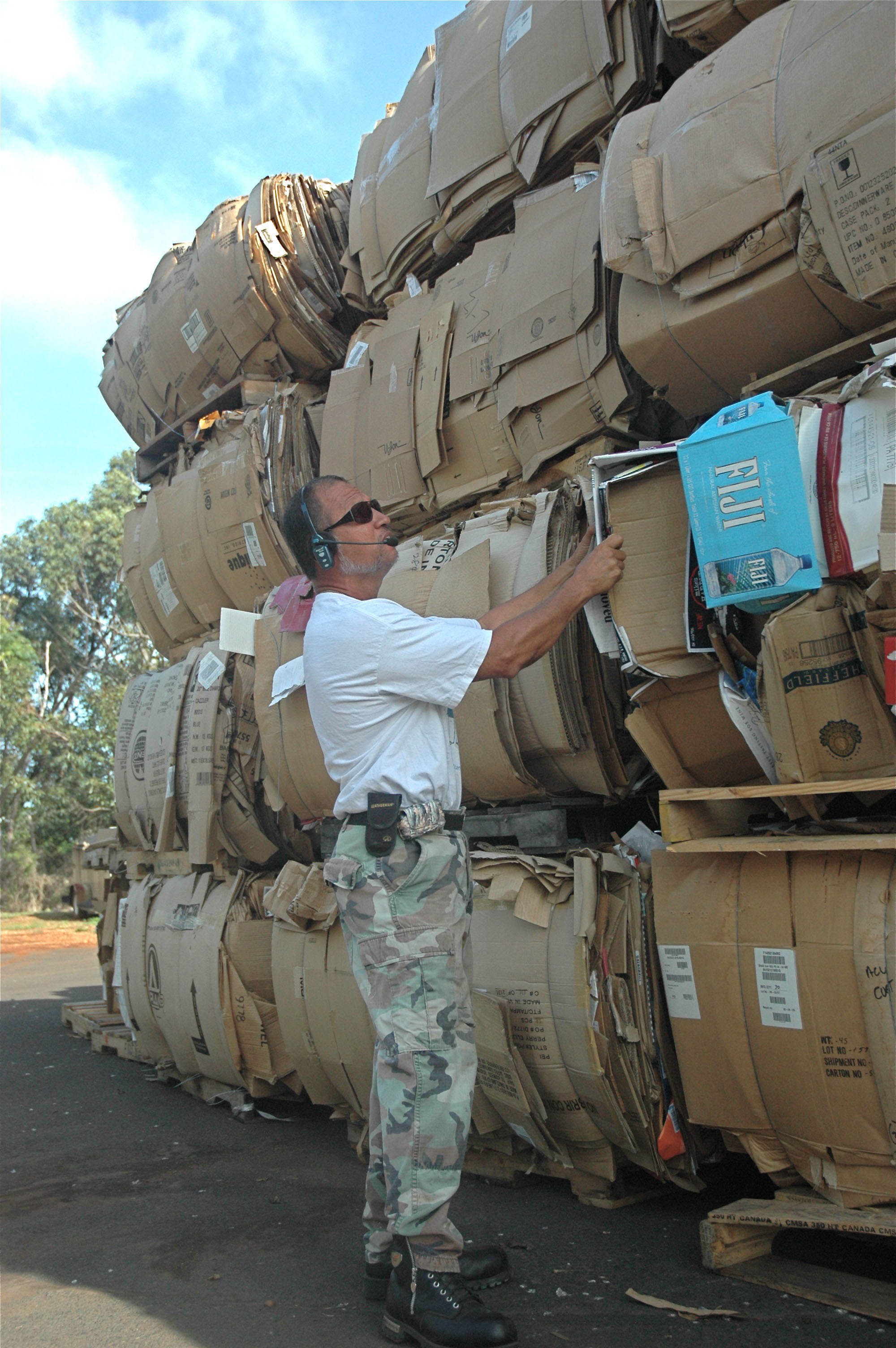
SCHOFIELD BARRACKS, Hawaii - As Americans get ready to double their recycling efforts for this Sunday's nationally recognized America Recycles Day, the Army is hoping that Soldiers and their family members follow suit, increasing their contributions when it comes to protecting the world's resources and environment.
According to a Department of Defense (DoD) mandate, service members and their families everywhere must do a better job at recycling in the coming months, said Kim DeCaprio, program specialist for U.S. Army Garrison-Hawaii's Solid Waste/Recycling/Pollution Prevention (P2) program.
"The DoD says we have to be recycling 40 percent of our items by the end of fiscal year 2010," she explained, noting that installations were successful at recycling about 30 percent of their household goods during the fourth quarter of FY 2009.
But while more people have been getting involved in recycling as of late, still some view the practice of recycling as nothing short of bothersome.
"We just have to increase awareness of it," DeCaprio said, "make it as easy as possible for people to participate."
Educating the public through various outlets remains the key, said Ann Choo Wharton, communications director for Army Hawaii Family Housing (AHFH).
"Recycling is something we encourage our residents to do," explained Wharton, noting that AHFH handles curbside pickup for approximately 6,000 residential homes at Oahu's various installations. "It's a message we continue to push through, for example, our (bimonthly) newsletter."
One way that service members may develop a greater desire to recycle is by understanding the role of the Army Recycling Center (ARC), here, and how it helps generate funds that benefit military families.
Located a short distance from McNair Gate, ARC serves as the storage hub for all Army recycling efforts, both residential and industrial. Trucks from Goodwill Contract Services Hawaii, Inc., roll in to the site on a daily basis, delivering more than 800,000 tons of recyclable material this year alone.
Once at ARC, the items are packaged and baled. There, they remain until qualified vendors take them off the center's hands, usually for a price, and ship them to markets all over the globe, where the material is recycled and reused rather than dumped into yet another landfill.
According to the center's project manager, Victor Mercado, the prices vary for recyclable goods, which include dry cardboard, newspaper, magazines, white office paper, phone books, scrap metal, toner cartridges and "HI-5" beverage containers. (See sidebar for a list of materials that aren't accepted at ARC.)
As of a few days ago, for example, the going rate for aluminum cans was just over $1.50 per pound, while the center earned $1.13 per pound for plastic containers and 3 cents for each unbroken bottle of glass.
Mercado strolled next to a stack of cardboard bales and tapped on them.
"These weigh between 700 and 800 pounds," he explained. "We pick up about 16 (bales) every day from businesses like AAFES, but during Christmas, (the number) may double."
At the moment, by fetching about $90 per ton, cardboard is easily ARC's biggest moneymaker.
"That's quite a bit of change for us," said Mercado, who runs the industrial side of the operation. "Right now, the rate is good, but it all depends on the market."
To further illustrate how the market fluctuates, Mercado explained that newspaper and white office paper, once an easy sale for ARC, are currently being handed over to vendors free of charge.
"But the market's been picking up," he said. "Eventually, they'll start paying for those items again."
And that's good news for Soldiers and families, who mostly benefit from the sale of recyclable materials through the Qualified Recycling Program (QRP), DeCaprio said.
"Aside from helping to pay for the center's operating costs, proceeds from the QRP help fund P2 projects, as well as many Family and Morale, Welfare and Recreation events," she said.
This year, for example, QRP donated $99,500 to cover entertainment and fireworks expenses for the Fourth of July celebration. "And some of that money will also go toward a few Christmas programs," she added.
But whether recyclable items make their way to the ARC or to some other recycling center is of little importance, Mercado said, so long as Soldiers and their families continue to do their part.
"A lot of the businesses at the installations won't turn in their HI-5 bottles, but will redeem them at a deposit center and then treat the Soldiers to something like pizza," he explained. "That's fine.
"If the Soldiers get something out of it, and if they continue to recycle, then that's all that matters," he added.
Materials not accepted at ARC
Not all recyclable items are accepted at the Army Recycling Center (ARC), located at Building 1087-B, McMahon Road.
"A lot of people don't understand that because we're in the middle of the Pacific Ocean, not everything that's recyclable can be taken by us and resold," explained Victor Mercado, the center's project manager.
The following are among items not approved for drop-off at ARC:
Aca,!Ac Appliances,
Aca,!Ac Fire extinguishers and other compressed gas cylinders,
Aca,!Ac Newspaper comic sections,
Aca,!Ac Color paper,
Aca,!Ac Trash,
Aca,!Ac Fluorescent bulbs,
Aca,!Ac Vehicle tires, and
Aca,!Ac Crosscut or "confetti-cut" shredded paper.
For questions regarding residential waste disposal, contact the Army Family Housing Center at 808-275-3189. For questions regarding industrial hazardous waste material, Soldiers should contact their unit's Environmental Compliance Officer (ECO).
The ARC is open from 7:30 a.m.-4 p.m., Monday-Friday. For more information, call 808-655-0011 or visit the Directorate of Public Works Web site at <a href="https://dpwhawaii.army.mil/pickup/">https://dpwhawaii.army.mil/pickup/</a>.

Social Sharing